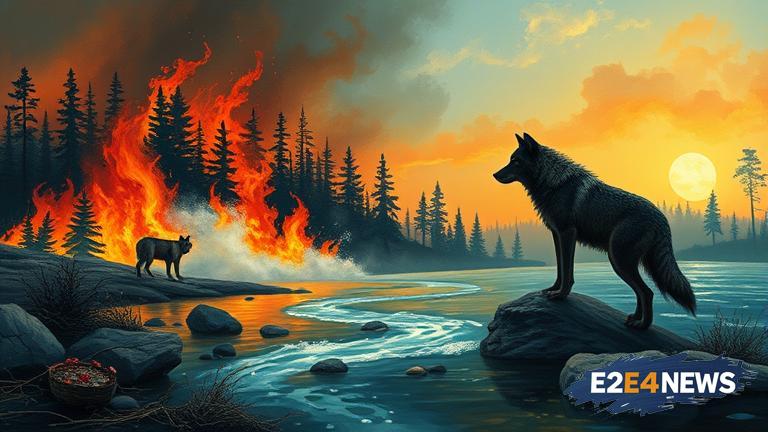The natural world is filled with complex and interconnected relationships, and one of the most fascinating examples of this can be seen in the dynamics between wildfires, wolves, and water. In a recent episode of Heritage Radio Network, expert Grace Woodmansee delves into the intricate balance of these elements and how they shape the ecosystems they inhabit. Woodmansee begins by discussing the role of wildfires in shaping the landscape, highlighting their ability to clear out dead vegetation and promote new growth. However, she also notes that wildfires can have devastating effects on local wildlife, including the loss of habitat and the disruption of delicate food chains. The introduction of wolves into an ecosystem can have a profound impact on the local wildlife, with the predators playing a crucial role in regulating prey populations and maintaining the balance of the ecosystem. But wolves are not just important for controlling prey populations, they also play a key role in shaping the physical landscape through their effects on vegetation and erosion. Water, too, is a critical component of ecosystems, providing a source of sustenance for plants and animals alike. The availability of water can have a significant impact on the local wildlife, with droughts and floods having far-reaching consequences for the ecosystem. Woodmansee also discusses the impact of human activity on these ecosystems, highlighting the ways in which human actions can disrupt the delicate balance of the natural world. The construction of dams, for example, can have a profound impact on the local wildlife, altering the natural flow of water and disrupting the habitats of plants and animals. Climate change, too, is having a significant impact on ecosystems, with rising temperatures and changing precipitation patterns altering the distribution and abundance of plants and animals. Despite these challenges, Woodmansee remains optimistic about the future of ecosystems, highlighting the importance of conservation efforts and the need for sustainable land management practices. By working to protect and preserve natural habitats, we can help to maintain the delicate balance of ecosystems and ensure the long-term health of the natural world. The relationship between wildfires, wolves, and water is a complex and multifaceted one, and understanding these dynamics is critical for developing effective conservation strategies. Woodmansee’s insights provide a valuable perspective on the importance of preserving natural habitats and the need for sustainable land management practices. The episode is a must-listen for anyone interested in the natural world and the complex relationships that shape ecosystems. With its in-depth discussion of the intricate balance between wildfires, wolves, and water, this episode provides a fascinating glimpse into the workings of the natural world. The importance of preserving natural habitats cannot be overstated, and Woodmansee’s discussion highlights the need for sustainable land management practices. The impact of human activity on ecosystems is a critical issue, and one that requires careful consideration and attention. By working to protect and preserve natural habitats, we can help to maintain the delicate balance of ecosystems and ensure the long-term health of the natural world. The relationship between wildfires, wolves, and water is just one example of the complex and interconnected relationships that exist in the natural world. Understanding these dynamics is critical for developing effective conservation strategies and ensuring the long-term health of ecosystems. Woodmansee’s discussion provides a valuable perspective on the importance of preserving natural habitats and the need for sustainable land management practices. The episode is a valuable resource for anyone interested in the natural world and the complex relationships that shape ecosystems. The delicate balance of ecosystems is a critical issue, and one that requires careful consideration and attention. By working to protect and preserve natural habitats, we can help to maintain the balance of ecosystems and ensure the long-term health of the natural world. The importance of preserving natural habitats cannot be overstated, and Woodmansee’s discussion highlights the need for sustainable land management practices. The impact of human activity on ecosystems is a critical issue, and one that requires careful consideration and attention. The relationship between wildfires, wolves, and water is a complex and multifaceted one, and understanding these dynamics is critical for developing effective conservation strategies. Woodmansee’s insights provide a valuable perspective on the importance of preserving natural habitats and the need for sustainable land management practices. The episode is a must-listen for anyone interested in the natural world and the complex relationships that shape ecosystems. With its in-depth discussion of the intricate balance between wildfires, wolves, and water, this episode provides a fascinating glimpse into the workings of the natural world. The natural world is filled with complex and interconnected relationships, and understanding these dynamics is critical for developing effective conservation strategies. The relationship between wildfires, wolves, and water is just one example of the complex and interconnected relationships that exist in the natural world. Woodmansee’s discussion provides a valuable perspective on the importance of preserving natural habitats and the need for sustainable land management practices. The episode is a valuable resource for anyone interested in the natural world and the complex relationships that shape ecosystems. The delicate balance of ecosystems is a critical issue, and one that requires careful consideration and attention. By working to protect and preserve natural habitats, we can help to maintain the balance of ecosystems and ensure the long-term health of the natural world.





